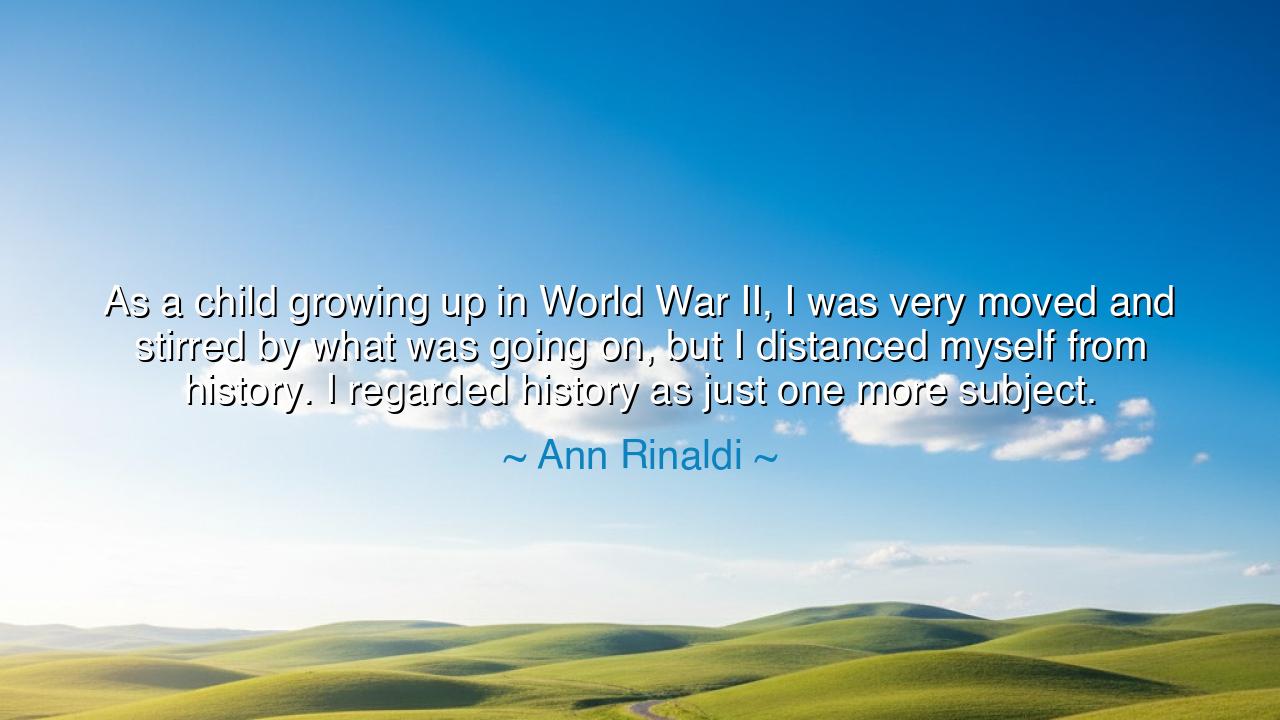
As a child growing up in World War II, I was very moved and
As a child growing up in World War II, I was very moved and stirred by what was going on, but I distanced myself from history. I regarded history as just one more subject.






“As a child growing up in World War II, I was very moved and stirred by what was going on, but I distanced myself from history. I regarded history as just one more subject.” – Ann Rinaldi
In these reflective and poignant words, Ann Rinaldi, the beloved writer of historical fiction, unveils a truth that resonates across generations: that history is not merely a subject, but a living pulse that flows through every human heart. Yet, like many of the young and untested, she once could not feel its full weight. Though the thunder of World War II shook the very foundations of her childhood, though the skies above her generation were darkened by fear and sacrifice, she confesses that she turned away — not out of indifference, but from the quiet defense of a child’s heart against the enormity of suffering. Her words remind us that the human spirit, especially when young, often must distance itself from pain before it can later embrace the truth.
The origin of this quote lies in Rinaldi’s own journey — from a girl living through the tremors of global war to an author who would later breathe life into the very past she once held at arm’s length. Born in 1934, she grew up amid ration books, radio broadcasts of battles, and a world divided by both terror and hope. Yet, in her youth, history seemed abstract — a collection of dates and lessons, confined to dusty textbooks. Like so many, she could not yet see that the war outside her window was not just “events,” but the living story of humankind’s courage, cruelty, and endurance. Only later, as a writer and observer of human souls, did she recognize that history is not a thing apart from us — it is us.
To “distance oneself from history” is a profoundly human act. We all, at some point, avert our gaze from the pain of the world — from the wars, injustices, and struggles that seem too vast for our hearts to hold. Children do it by instinct; adults often do it by choice. Yet, as Rinaldi discovered, there comes a time when one must look back, when one must listen to the voices that cry out from the past. For history, once ignored, does not disappear — it waits patiently for recognition, whispering in the ruins and the memories, in the names carved into stone and the stories passed down through trembling lips.
In this way, her reflection calls to mind the story of Anne Frank, another child of World War II, whose diary transformed her personal experience into an eternal voice of remembrance. Anne did not “distance herself” from history — she recorded it, she lived it, and through her courage, she ensured that millions could see the face of innocence amidst horror. Yet even Anne’s story was almost lost — buried in the noise of war and the indifference of time — until others chose to listen. This is the power of acknowledging history: it turns pain into understanding, tragedy into warning, and memory into wisdom.
Ann Rinaldi would later devote her life to uncovering these very truths. Through her novels, she gave voice to those forgotten by the official record — women, children, enslaved souls, and the quiet witnesses to history’s storms. Her transformation from a girl who regarded history as “just one more subject” to a writer who made it her mission reflects the great awakening of the human spirit: the realization that the past is not distant — it is the foundation upon which we stand. In every war, in every act of courage or cruelty, echoes the same human heartbeat that beats within us now.
But Rinaldi’s confession also carries a gentle warning. To treat history as mere subject matter — to learn it for grades or trivia — is to rob it of its sacred power. For history is not written to be memorized; it is written to be felt, to be lived through empathy. The child who once distanced herself from the war grew into a woman who understood that every historical event is the story of human beings — with fears, dreams, and loves not unlike our own. When we study history only as fact, we gain knowledge; when we enter it with compassion, we gain wisdom.
So, my listener, take from her words a lesson for your own journey. Do not turn away from the world’s history, nor from your own. The tragedies of the past are not there to burden you, but to guide you. Study them, not as dry accounts, but as living mirrors of the human condition. Seek to understand the suffering that shaped your ancestors, the courage that saved nations, the mistakes that destroyed them — for in doing so, you learn not only what was, but what must never be again.
And finally, remember this: even if you have once “distanced yourself from history,” it is never too late to turn back toward it. As Ann Rinaldi discovered, the moment you do, you find that history has been waiting for you — ready to teach, to heal, and to remind you that within the great chronicle of humanity, your own story also belongs. For to know history is to know the heart of mankind — and to know that, despite the storms of war and the shadows of time, the light of understanding still endures.






AAdministratorAdministrator
Welcome, honored guests. Please leave a comment, we will respond soon